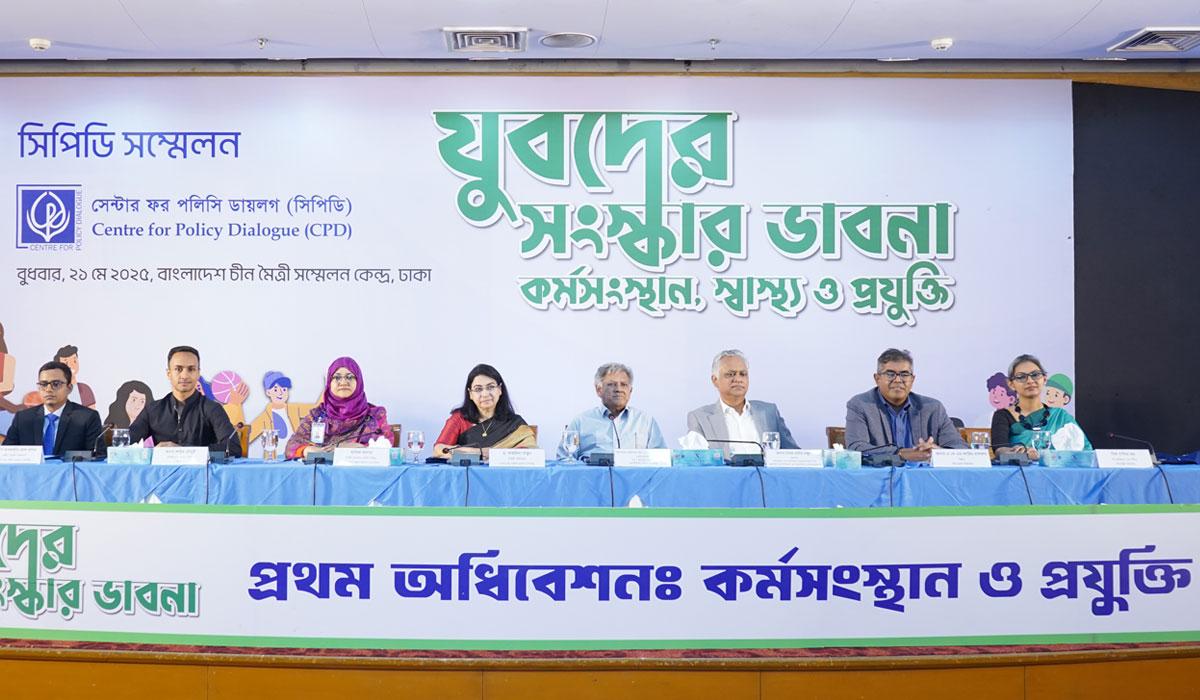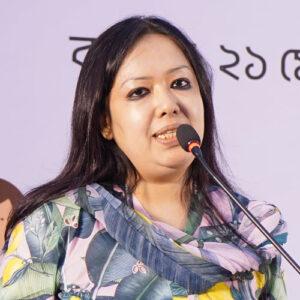
Youth from across Bangladesh gathered in Dhaka to discuss reforms related to the use of technology in employment and health at a conference titled ‘Youth’s Perspectives on Reforms: Employment Health and Technology’. The event, held on 21 May 2025, provided a platform for young people to share their views on key issues shaping the country’s future and to express the reforms they hope to see implemented. Around 300 participants from Dhaka and other parts of the country joined the conference and contributed valuable insights.
- Presentation on Youths Perspectives on Reforms Employment and Technology
- Presentation on Youths Perspectives on Reforms Health and Technology
The conference featured three sessions. The first focused on youth employment in the era of the Fourth Industrial Revolution and was chaired by Dr Fahmida Khatun, Executive Director of the Centre for Policy Dialogue (CPD).
She highlighted Bangladesh’s youth unemployment rate of 7.3 per cent and the significant challenges the country faces, including skills mismatches and limited access to digital technology—particularly for women. With nearly 29 per cent of the population aged 15 to 29, Dr Khatun and other experts emphasised the urgent need to equip young people with the skills required to thrive in emerging industries.

Mr Foqoruddin Al Kabir, Senior Research Associate, CPD, presented proposals including updating employment policies, expanding digital skills training, and establishing innovation hubs at district and university levels. He also stressed that bridging the digital gender divide is critical to ensure equal opportunities.
The second session examined the role of technology in health sector reforms and was presented by Ms Preetilata Khondaker Huq, Programme Associate (Research) at CPD. She noted that Bangladesh’s health spending remains low, with high out-of-pocket costs pushing many families into poverty. Digital healthcare solutions such as telemedicine and mobile health applications were discussed as promising tools to improve access, particularly in rural areas.

However, participants noted barriers including poor digital infrastructure, low digital literacy among healthcare workers, and governance challenges. Calls were made for greater public investment in health, universal primary care, and stronger oversight through an independent health commission.
Between these sessions, a youth parliamentary debate brought fresh perspectives and spirited discussion on the current political situation in Bangladesh how reforms in employment, health and technology can better serve the country’s young population.
‘Embracing modern technology is essential for Bangladesh to overcome emerging challenges and accelerate national development’, said Labour and Employment Adviser Brigadier General (retd) Dr M Sakhawat Hossain.
BNP’s Assistant International Affairs Secretary, Barrister Rumeen Farhana, said health budgets have long been below 1 per cent of GDP, causing shortages of staff and poor hospital conditions. She urged a law requiring MPs and their families to receive treatment only in public hospitals, arguing this would drive improvements in public healthcare.

Mr AKM Fahim Mashroor, CEO of bdjobs, warned that rising unemployment in Bangladesh, especially among the youth, has evolved beyond an economic problem into a serious social and political issue. He pointed to the July protests over government job quotas as evidence of this growing concern.
‘Young people need to move beyond a fixation on government jobs, start-ups, and working abroad,’ urged Mr Syed Nasim Manzur, president of the Leathergoods and Footwear Manufacturers and Exporters Association of Bangladesh (LFMEAB).
Ms Alif Rudaba, a member of the National Skills Development Authority, stressed that GDP growth depends on increased industrial production and urged a focus on quality jobs in both public and private sectors.
Mr Shahir Chowdhury, Founder and CEO of Shikho, urged the government to increase education budget allocations to develop quality human resources. ‘To properly capture youth participation and employment growth in national policies, informal sectors like freelancing need to be formalised’, said Ms Sadia Haque, CEO and co-founder of ShareTrip Limited.
Dr. Tasnim Jara, senior joint secretary of the Jatiya Nagorik Committee, highlighted the strain on public hospitals and said, ‘A central health information portal, digital records, and a referral system could ease access and reduce patient suffering’.
‘Urgent implementation is needed for a healthcare reform report based on promotive, preventive, curative, rehabilitative, and palliative care’, said public health expert Dr. Lelin Choudhury.
‘Bangladesh allocates the lowest health budget in Southeast Asia’, noted Dr. Abu Muhammad Zakir Hossain, member of the Healthcare Reform Commission, ‘and revising it every ten years according to population needs is recommended’. ‘Integrating technology into primary healthcare will reduce dependency, and local production of medical devices can boost employment’, added Professor Liaquat Ali, also from the Commission.
‘Investing in youth mental health and nutrition will yield significant long-term returns’, stressed economist and Dhaka University, Professor Rumana Haque. Dr Khondaker Abdullah -Al-Mamun, Professor, Department of CSE, United International University (UIU), said that while Bangladesh has community health workers, they are not specialised to treat people of all ages, resulting in a significant gap.
The conference underscored the crucial role of youth in driving Bangladesh’s development. Policymakers, development partners and young people themselves were urged to work together to create a more inclusive, digitally empowered future.



